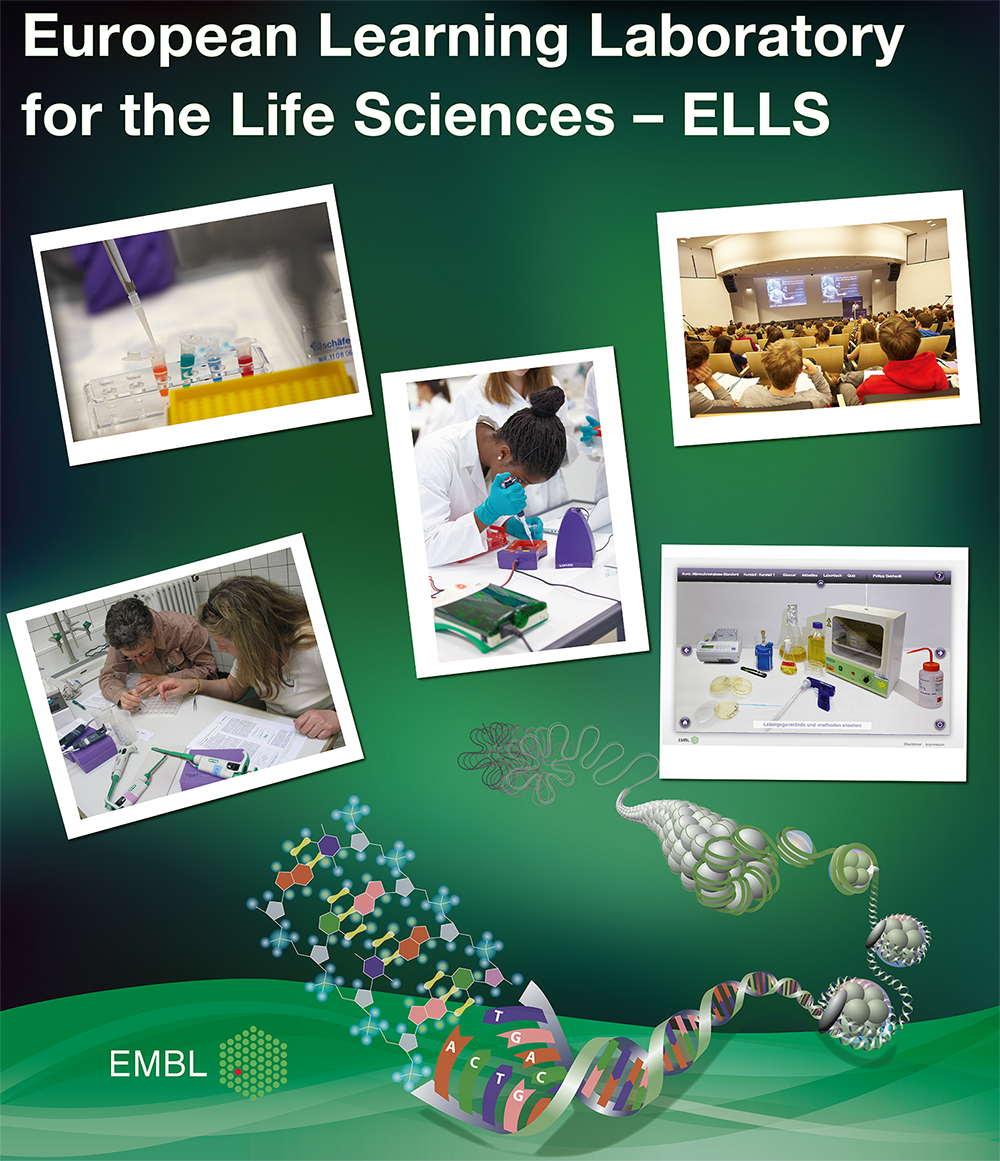The European Learning Laboratory for the Life Sciences – Bridging the gap between science and schools
Posted by Philipp Gebhardt, on 17 October 2013
Research in the modern life sciences is moving forward at an enormous pace and is generating massive amounts of data and new insights into the molecular principles of life on Earth. More than ever it is important for science teachers to stay up-to-date and to refresh their knowledge continuously. They are an important professional group, which can directly foster young people’s interest in science, thereby taking the role of a “door opener” for a huge pool of talented future scientists.
Ten years ago – in 2003 – the European Molecular Biology Laboratory (EMBL) launched the European Learning Laboratory for the Life Sciences (ELLS) to address the demand for continuing professional development of secondary school science teachers. The science education facility has been created to bring secondary school teachers and students into the research lab. Exciting hands-on encounters with state-of-the-art molecular biology techniques help bridge the gap between research and schools.
As an integral part of the EMBL, ELLS is embedded in the scientific environment of one of the world’s most renowned research institutions. The EMBL has an international staff of dynamic scientists, and is in the unique position to connect scientific expertise directly with educational outreach activities. We are therefore aiming to engage teachers with contemporary research and with the scientists pursuing research projects at the forefront of science.
ELLS’ core activities include the organization of multifaceted training opportunities to bring the modern concepts of molecular biology into the classroom. High school science teachers are supported to further develop their hands-on expertise and to refresh their content knowledge during the popular ELLS LearningLABs. These multi-day workshops for international groups of teachers bring the participants in contact with the institute‘s vibrant scientific environment. A blend of practical experiments, presentations by EMBL research scientists and visits to world-class research facilities foster an extensive dialogue between course participants, scientists and stakeholders from related disciplines. Another important aspect of these training courses for teachers is that they provide a platform for EMBL’s staff to communicate science to a wider audience. EMBL pre- and postdoctoral students, research scientists and technical assistants are primed to use these opportunities and to develop their communication and presentation skills. These are skill sets that are becoming increasingly important for scientists who very often have to communicate their findings to non-scientific audiences and to reassure taxpayers that their research money is well invested.
ELLS LearningLABs are tackling all aspects of basic research performed at EMBL’s five sites. The courses are specifically tailored to the needs of teachers as they link to scientific topics that are represented on modern school science curricula. Furthermore, we closely observe newly emerging research topics and are continuously exploring ways to include them in our training courses. An example is the increasing importance of bioinformatics – the computational analysis of large volumes of biological data derived from the life sciences. It has become a core feature of biological research and we have organised a series of ELLS LearningLABs on bioinformatics for secondary-school science teachers from across Europe to support them in the use of bioinformatics resources in inquiry-based learning. Bioinformatics is essential for making sense of data produced by new technologies – such as genome sequencing – and aspects of bioinformatics will also affect wider society, e.g. in terms of healthcare. However, this revolution has not yet filtered down to education. A comparison of the numbers of bioinformatics resource websites and the number of educational websites for bioinformatics further emphasises the lag in seeing practical knowledge of bioinformatics tools and resources reflected in the classroom and curriculum[i].
During our Bioinformatics LearningLABs we provide interactive introductions to the field of bioinformatics. We present opportunities to use basic bioinformatics resources in the classroom and equip the teachers with simple, easily transferable, classroom activities to support their teaching of biology. We have observed that, although teachers are aware of bioinformatics as a concept, they see a clear need for increasing their knowledge of this area and for receiving help with the initial implementation of the concepts. Orientation and practical demonstration of how the resources can be used opens up a world of new possibilities to ultimately connect students to learning about and doing science. We have recently published our experiences on creating and running bioinformatics training courses for European secondary school science teachers. Our article “Bioinformatics Goes to School—New Avenues for Teaching Contemporary Biology”[ii] is freely available on the PLOS Computational Biology website and contains useful information for trainers and institutions who are considering to replicate teacher training courses on bioinformatics.
In addition to the face-to-face training courses, the ELLS also offers training events via the internet. The recently started ELLS Webinars are online seminars presented in our virtual auditorium. Interested teachers can attend these 1 hour long online events from home, which minimizes the time and the financial investment associated with standard on-site courses. The idea behind these interactive online presentations by EMBL scientists is to share research results in clear and engaging presentations. The participants value the “direct line” to ask questions to the speakers. It presents an exciting opportunity to enter in an open dialogue about contemporary research topics with the presenters. In addition, the ELLS Webinars offer a platform to highlight teaching resources related to the topics discussed and to share personal teaching experiences among the participating teachers.
Information on a wide range of ELLS activities, our teaching resources and the latest news on ground-breaking discoveries by EMBL scientists are freely available online and we cordially invite you to explore them on the brand-new ELLS teachers’ portal EMBLog (www.emblog.embl.de/ells).
[i] Cummings MP, Temple GG (2010) Broader incorporation of bioinformatics in education: opportunities and challenges. Brief Bioinform 11: 537–543. doi: 10.1093/bib/bbq058. Available: http://bib.oxfordjournals.org/content/11/6/537.long.
[ii] Wood, L, Gebhardt P (2013) Bioinformatics goes to school – new avenues for teaching contemporary biology. PLoS Comput Biol 9(6): e1003089. doi:10.1371/journal.pcbi.1003089 Available: http://www.ploscompbiol.org/article/info%3Adoi%2F10.1371%2Fjournal.pcbi.1003089
 This post is part of a series on science outreach. You can read the introduction to the series here and read other posts in this series here.
This post is part of a series on science outreach. You can read the introduction to the series here and read other posts in this series here.



 (4 votes)
(4 votes)